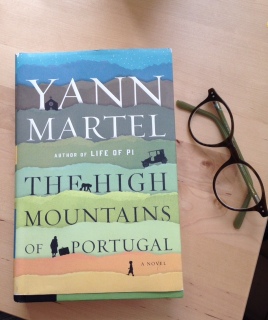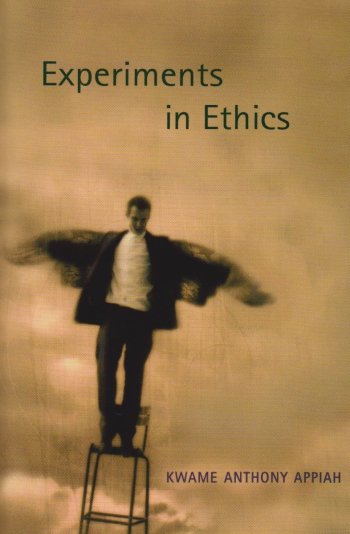
Experiments in Ethics by Kwame Anthony Appiah. Photo credit: Amazon.com (https://images-na.ssl-images-amazon.com/images/I/71KPVAHdjlL.jpg).
You’re in a dilemma. A train is about to run over five people strapped to the tracks. You may pull a lever to switch the train to another track where the train would only kill one person. In this thought experiment, known as the trolley problem, what would you do? Some might argue that killing fewer people is a more favorable outcome, therefore, they would pull the lever. Others might stick to moral grounds of life-or-death decisions and choose to not pull the lever. Regardless, the way humans respond to the trolley problem is part of our ethical dilemmas. From large-scale issues such as access to health care to everyday experiences like giving money to homeless beggars, we test our sense of morality everyday. And the way science and philosophy intertwine with one another become apparent.
It’s hard to ignore the alarms on science and health anymore. With current concerns brought on by gene editing, end-of-life care, and self-driving cars, the boundaries between right and wrong become fuzzy. Philosophers and scientists have taken center stage in battles of these ethical issues. And, with these ethical questions raised, we’ve developed new ways of looking at the world. Drawing from history, scientific experiment, and speculation, Kwame Appiah’s “Experiments in Ethics,” takes a look at this ethical research through the history of science and philosophy. Like the Trolley Problem shows, our own morality is deeply embedded in human nature, and a combination of science and philosophy, when studied together, can provide this insight into right and wrong.
As Appiah explains, science and philosophy have had a long history hand-in-hand with one another. As 18th-century German philosopher Immanuel Kant said, studying concepts of the mind without empirical science is empty and studying science without philosophy is blind. David Hume, 18th-century Scottish philosopher, sought to show that moral philosophy makes sense with human nature.
American rapper Rakim said, “Scientists try to solve the context. Philosophers are wondering what’s next,” in his song “Don’t Sweat the Technique.” Though Rakim brags about these researchers trying to understand his sick lyrics and rhymes, it’s a helpful distinction to show. Scientists want to know the material world, what things are made of, and empirical causes for observations. Philosophers speculate, search for answers that result from reasoning, and find answers for more open-ended questions. This generalized boundary between scientists and philosophers – with the former studying the present and the latter looking to the future – rings through in our current events. Understanding these connections between these fields, the stage is set for making sense of human morality.
Our current understanding of moral responsibility hinges on how people behave in tricky situations. Like participants in the trolley problem, events such as the Rwandan genocide of 1994, come about by those ethical decisions by people in dangerous situations. Appiah argues that people should understand how to reason ethically in dire situations – rather than education solely on virtuous characteristics. The way we behave with courage, generosity, patience, or other ways of describing moral behavior, results from these decisions.
Appiah’s writing is eclectic, drawing from contemporary social psychologists to the Classical philosophers. Yet, his writing style is easy to understand and elegant in delivering difficult-to-understand concepts. I found his book “Experiments in Ethics” inspirational to my career as a scientist-philosophy bounty hunter. It sparked a fire inside me during my senior thesis research while I was an undergraduate. His writing makes the reader feel as though they truly can understand philosophy, and he gives people insight into their own moral behavior. Like any researcher, we’re always trying to solve the context while wondering what’s next.
See more from Hussain at his blog: http://www.hussainather.com/

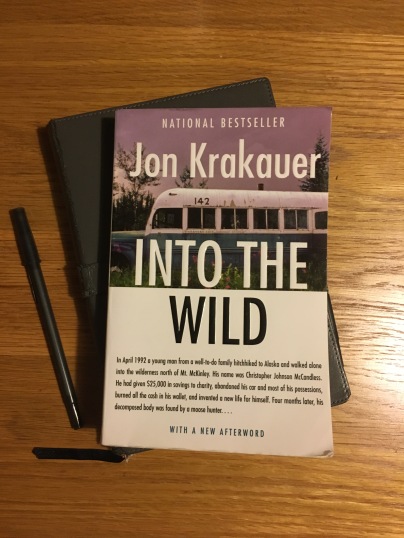 Being somewhat of a wanderer myself, I was excited to finally read Into the Wild by Krakauer. This true story is about a young man, Christopher McCandless, who leaves his home in Virginia to wander the country alone with no money, no plan, and no destination. Krakauer follows his journey through the American west, piecing together the details, and all the way to Alaska, where McCandless’s body was found in a rusted bus near the Stampede Trail. Part documentary, part commentary on restless youth, I was at a loss as to whether I liked this book or not.
Being somewhat of a wanderer myself, I was excited to finally read Into the Wild by Krakauer. This true story is about a young man, Christopher McCandless, who leaves his home in Virginia to wander the country alone with no money, no plan, and no destination. Krakauer follows his journey through the American west, piecing together the details, and all the way to Alaska, where McCandless’s body was found in a rusted bus near the Stampede Trail. Part documentary, part commentary on restless youth, I was at a loss as to whether I liked this book or not.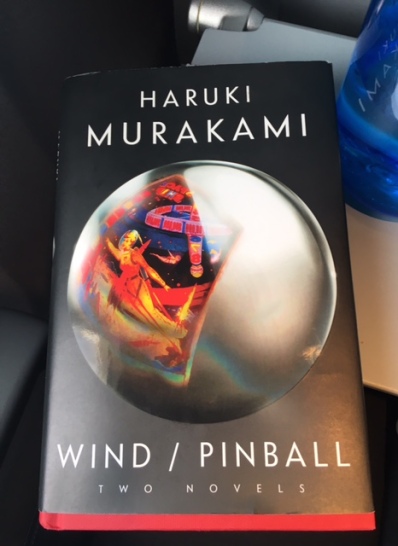 Although the two short stories featured in Haruki Murakami’s Wind/Pinball are the product of the author’s first endeavor to put pen to paper, they are still classic Murakami—meandering tales with no resolution and a lot that’s left unsaid. Murakami fans will know what I mean, but for those who don’t I like to put it this way: read Murakami for his writing and your own contemplation and not for a story or an ending.
Although the two short stories featured in Haruki Murakami’s Wind/Pinball are the product of the author’s first endeavor to put pen to paper, they are still classic Murakami—meandering tales with no resolution and a lot that’s left unsaid. Murakami fans will know what I mean, but for those who don’t I like to put it this way: read Murakami for his writing and your own contemplation and not for a story or an ending.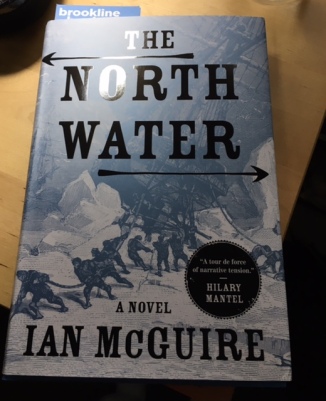 Patrick Sumner is an ex-army surgeon running from his past. Henry Drax is a harpooner with an insatiable thirst for blood. Both board the Volunteer, a whaling ship setting out from Hull to hunt for blubber in the Arctic Circle. As they head north, the secondary purpose of the expedition unfolds together with the cataclysmic depravity of Drax’s nature. Can Sumner, lost in the grips of a laudanum addiction and feelings of deep emptiness, fight against Drax and find his way through the winter and home?
Patrick Sumner is an ex-army surgeon running from his past. Henry Drax is a harpooner with an insatiable thirst for blood. Both board the Volunteer, a whaling ship setting out from Hull to hunt for blubber in the Arctic Circle. As they head north, the secondary purpose of the expedition unfolds together with the cataclysmic depravity of Drax’s nature. Can Sumner, lost in the grips of a laudanum addiction and feelings of deep emptiness, fight against Drax and find his way through the winter and home? Hey all, last Saturday I went to the Boston Book Festival and attended some great panels that discussed books and writing. I live tweeted soundbites all day
Hey all, last Saturday I went to the Boston Book Festival and attended some great panels that discussed books and writing. I live tweeted soundbites all day 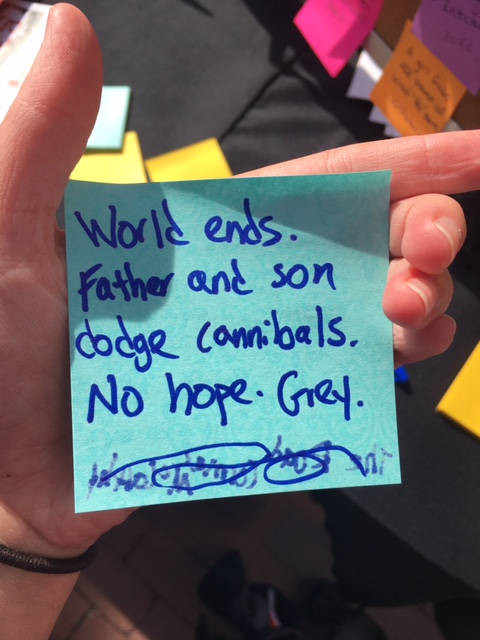
 Fantasy and reality combine in this book of short stories. In one, a husband and wife who are drifting apart conduct an experiment where they watch their hopes and fears manifest before them. In another, a girl joins a puppeteer school where the puppets and their human controllers change each other. Each story explores truths of the human existence, revealing them in ways that seem not quite possible, but still wholly believable and enlightening.
Fantasy and reality combine in this book of short stories. In one, a husband and wife who are drifting apart conduct an experiment where they watch their hopes and fears manifest before them. In another, a girl joins a puppeteer school where the puppets and their human controllers change each other. Each story explores truths of the human existence, revealing them in ways that seem not quite possible, but still wholly believable and enlightening. In the 1950s the Swiss dye manufacturing company Ciba-Geigy arrived in Toms River, a small town by the Jersey shore. Its arrival brought jobs, and a boon to the local economy, helping Toms River to grow in size and wealth. Yet, as the residents were quietly watching their town prosper, hidden behind the trees on the factory’s vast property, Ciba-Geigy was dumping billions of tons of hazardous chemical waste into the river, unlined landfills, and eventually the ocean. Soon, residents began to notice a foul smell and taste in their drinking water, and children were seemingly born with unusually high levels of childhood brain and spinal cancers.
In the 1950s the Swiss dye manufacturing company Ciba-Geigy arrived in Toms River, a small town by the Jersey shore. Its arrival brought jobs, and a boon to the local economy, helping Toms River to grow in size and wealth. Yet, as the residents were quietly watching their town prosper, hidden behind the trees on the factory’s vast property, Ciba-Geigy was dumping billions of tons of hazardous chemical waste into the river, unlined landfills, and eventually the ocean. Soon, residents began to notice a foul smell and taste in their drinking water, and children were seemingly born with unusually high levels of childhood brain and spinal cancers.